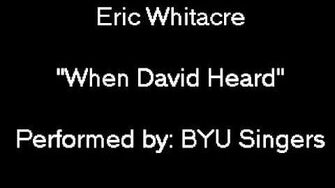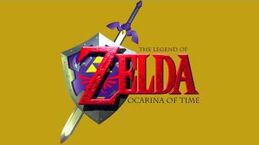The Merriam-Webster Dictionary defines "aurality" as "of or relating to the ear or to the sense of hearing[1]". The root of the word aural, comes from the latin word for ear, "auris". In the discussion of WAM though, aurality is not only this but also a way to "hear" through media. Most controversial in our focus on aurality in WAM is the discussion of how it contributes to our understanding of a subject through the medium of sound. Why choose an audio byte of a child crying to communicate a child in pain, rather than an image of a child in some third world country, clutching a stomach swollen with hunger, tears streaming down his cheeks, and wearing two mismatched crocs? We get more information from the image, but the feeling is intensified, it is deepened, with the soundbyte of the crying. As Rice simply put it in an article we read close to the beginning of the year, "Sound intensifies awareness. Technology, as Ong also stated, accelerates that intensification, forcing us to hear more than one event at once.."[2]
Examples of Aurality || Sound as a Medium[]

Cat Meows Underwater
This is a sad cat in a bath. You feel bad for the sad cat, and worse after it meows. This is even worse after the owner calls it by its sad name. "McLovin'". This is an example of aurality heightening awareness.
One good example of how effective this can be is one of the thousands of cute cat videos you see on the internet[3]. There's no deep message here, but when you see the image of the fluffy kitty, your heart melts. But it isn't until the kitty opens its little mouth and a tiny "mew" comes out that you truly hit cuteness overload. If this little cat hadn't made the little noise, it would not have gotten nearly as many views (upwards of 12 million). Aurality is a powerful communicator, and sound often touches people in a way that an image or bit of writing can't. The duty of an image is to give you a view of something, the job of a piece of writing is to create a space for you, and the ability of sound is to immerse you in your own heightened sonic experience.
Another example of the power of aurality is music itself, and for this example I've brought in an audio bit from one of my favorite composers, Eric Whitacre (he's a genius look him up). He's a classical composer in a modern world, and has made his fame on the internet mostly through his gorgeous music, but also through his "virtual choirs". His Virtual Choirs are just that: people singing together, through the internet, through the webcams on their computers, all synced up to match. Crazy. But as Whitacre is a classic composer, many of his works are of latin texts or beautiful poetry. The language of the text is often very simplified with Whitacre,

Eric Whitacre "When David Heard" performed by BYU Singers
The section of this song discussed in this wiki is 8:30-10:32.
a backdrop to the beautiful things he does with sound. The only text for this piece comes from the bible. The following is taken from Whitacre's website about the song's lyrics: "The text, one single, devastating sentence, is from the King James Bible; II Samuel, 18:33: 'When David heard that Absalom was slain he went up into his chamber over the gate and wept, my son, my son, O Absalom my son, would God I had died for thee!'[4]" Of this, the majority of the song is the repeated lyric "my son". The phrase is repeated so often, that the focus becomes so much less on the lyric itslef and more on the aurality of the sound you are hearing, as well as what it is trying to communicate. Every time I listen to this song[5], I cry. Without fail. The sheer wall of sound the choir creates is....agonizing in a way an image would be hard pressed to recreate. I'm not saying that I wouldn't feel as bad looking at a tragic image, it's just that aurality not only intensifies an experience, but it makes it personal. You are more likely to tear up at the first bar of your grandmother's favorite song than if you heard someone simply speaking the lyrics, or saw the title somewhere.
My last example of the power of aurality as a medium is one that I hope many people will relate to, and that is the ability to transport you through time. We all loved watching Disney movies when we were kids--learned all the lyrics, the solos, some of the more ambitious of us even learned the harmonies. When you hear even a bit of that old disney music on someone's iTunes library or road trip playlist, you feel it: nostalgia. Suddenly you're a kid again, grabbing pots and pans and singing along with Turk and the other gorillas from Tarzan, or you're six years old, in the tub, singin' The Little Mermaid songs at the top of your little lungs. You feel that when you hear those songs now. The sense of childhood, of bliss, of adventure makes you want to stand up and sing it again, even though you're a grown-up and it's been years since you've seen that movie. A related example that perhaps fewer people will understand, but that is just as effective as disney music, is video game music. As soon as I hear title music from any of the games I played when I was little, it all comes back--the playable story I experienced, the characters I loved, the baddies I beat. And I smile, because it's all beautiful and makes me feel that again. That is the true power of aurality. To transport you in time and to heighten your experience. It's almost like a little high, a shocking, connective high, and it's what makes it such a powerful medium.

Title Theme - The Legend of Zelda- Ocarina of Time
Title Music from one of my favorite games--played it all the time as a kid. Listening to this makes me want to pick up a controller and save the world all over again. The true power of aurality is found in this feeling.

The lion King - I just can't wait to be king
Don't pretend listening to this didn't make you want to get up and dance.
citation for zelda[6] video and for lion king [7] video
Keywords:
Aurality
- ↑ "Aural." Merriam-Webster. Merriam-Webster, n.d. Web. 24 Nov. 2014. <http://www.merriam-webster.com/dictionary/aural>.
- ↑ Rice, Jeff. "The Making of Ka-knowledge: Digital Aurality." Computers and Composition 23.3 (2006): 266-79. Web.
- ↑ SchneiderYuri. "Cat Meows Underwater." YouTube. YouTube, 17 Feb. 2013. Web. 24 Nov. 2014. <https://www.youtube.com/watch?v=dvMssEgp1ko>.
- ↑ "When David Heard." Eric Whitacre. N.p., n.d. Web. 24 Nov. 2014. <http://ericwhitacre.com/music-catalog/satb-choral/when-david-heard>.
- ↑ Halcomb, Frank. "Eric Whitacre: "When David Heard" Performed by BYU Singers." YouTube. YouTube, 26 Oct. 2011. Web. 24 Nov. 2014. <https://www.youtube.com/watch?v=G2ZKKXCuaYc>
- ↑ Kondo, Koji. Title Theme - The Legend of Zelda: Ocarina of Time. Nintendo, 1998. YouTube. Web. 24 Nov. 2014. <https://www.youtube.com/watch?v=5ShzyggtsCs>.
- ↑ The Lion King - I Just Can't Wait to Be King. Dir. Roger Allers and Rob Minkoff. Perf. Jason Weaver Laura Williams, Rowan Atkinson. Walt Disney Pictures, 1994. YouTube. YouTube. Web. 24 Nov. 2014. <https://www.youtube.com/watch?v=KXs8OS6EdAE>.